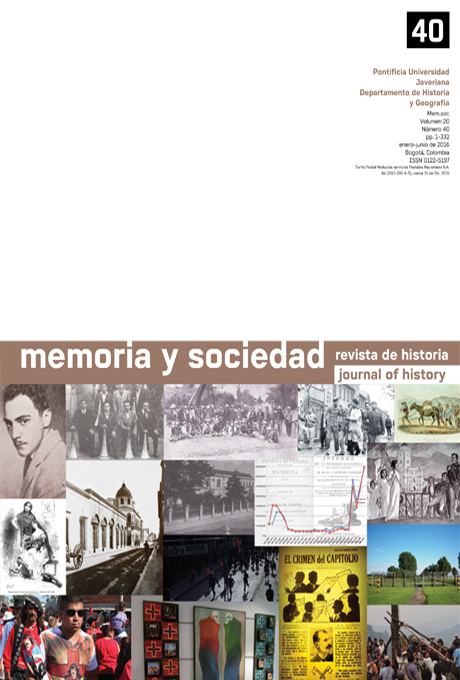Abstract
This article studies the political interaction of
women with their context and their constructions
as political subjects – in all their complexity
– beyond their vocal opposition or support
to a party during the Independence of the New
Granada period, particularly in Santafe, from
1810 to 1820. First of all, we tackle the reciprocal
relationship of rights and duties held
with the government as women, which implied
gender-differentiated functions that were
accepted (or not), helping to maintain the established
order (or challenging it). Second, we
deal with the reciprocal relationship of rights
and duties held with the government, not only
as women, but as vassals, citizens, or, the mere
generic concept of “people under the government”.
This concept makes it possible to overcome
the resistance of the actors of the time to
concede a political status to them. Lastly, we
analyze their construction as political supporters
and detractors.
The journal Memoria y Sociedad is registered under a Creative Commons Attribution 4.0 International Public License. Thus, this work may be reproduced, distributed, and publicly shared in digital format, as long as the names of the authors and Pontificia Universidad Javeriana are acknowledged. Others are allowed to quote, adapt, transform, auto-archive, republish, and create based on this material, for any purpose (even commercial ones), provided the authorship is duly acknowledged, a link to the original work is provided, and it is specified if changes have been made. Pontificia Universidad Javeriana does not hold the rights of published works and the authors are solely responsible for the contents of their works; they keep the moral, intellectual, privacy, and publicity rights.
Approving the intervention of the work (review, copy-editing, translation, layout) and the following outreach, are granted through an use license and not through an assignment of rights. This means the journal and Pontificia Universidad Javeriana cannot be held responsible for any ethical malpractice by the authors. As a consequence of the protection granted by the use license, the journal is not required to publish recantations or modify information already published, unless the errata stems from the editorial management process. Publishing contents in this journal does not generate royalties for contributors.

